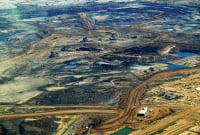Support strong Canadian climate journalism for 2025
Federal support for Indigenous hunters and fishers tackling food insecurity in northern communities is poised to fall by 80 per cent. The decision comes as the government continues to pour millions into a subsidy program researchers say is lining grocers' pockets without providing adequate food to those most in need.
The cuts to hunting support are being made to the so-called "harvester's grant," a program established in 2020 with $40 million over five years as part of Nutrition North. Nutrition North is the federal government's main program to tackle food insecurity in northern Canada and primarily provides grocers with a $131-million annual subsidy to reduce food transportation costs.
The harvester's grant was created to improve access to traditional foods and lower the costs of key hunting equipment, like gas and bullets. It is an approach northern food advocates say offers northerners higher-quality food than what is available at grocery stores while reducing the impact of supply chain disruptions and bolstering traditional cultural skills.
Funding for the program will fall about 80 per cent, from $36 million — part of a two-year funding package to support local food announced in 2021 — to $8 million as of 2024.
"It’s shameful that this Liberal government is sunsetting funding for the Harvesters Support Grant," said NDP MP for Nunavut Lori Idlout in a statement. "Northerners deserve access to quality, affordable groceries and to local food sources. Hunters in the North do important work, and this funding should be made long-term to support these communities. The Minister must demonstrate his commitment to Northern food security by continuing this support to harvesters."
Throughout the 1900s, federal officials enacted a suite of policies, like sled dog culls and residential schools, designed to reduce Indigenous Peoples' ability to hunt, creating a "dependence on store-bought foods (that) has kind of manufactured the food insecurity we see today," explained Beth Kotierk, an Inuk lawyer and former member of Nutrition North's advisory council. She resigned this month over the federal government's refusal to condemn Israel's violence against civilians in Gaza.
"It's really important we revitalize the hunting and harvesting in the North because that's really the way out of the long-standing food insecurity problem we have."
Grocery prices in the North are routinely two to three times higher than in the rest of Canada, contributing to the region's high rates of food insecurity, particularly among Indigenous people. Nearly half of households in Nunavut alone can't afford enough food, and the social ill is prevalent in other northern regions as well.
Nutrition North program is the federal government’s only northern-specific program focused on food. But critics say the program's primary approach — subsidizing grocers' transportation costs — is failing.
This fall, researchers concluded that grocers receiving the subsidy were not passing on its full value to consumers, instead pocketing between one- to two-thirds of the money they received from the government. Nutrition North rules state that retailers who receive the subsidy must pass it on fully to consumers.
Because the program leaves pricing decisions entirely to retailers, it is almost impossible for regular consumers to determine how much of the subsidy is being passed on to them. The researchers used complex tools to analyze food price changes compared to subsidy changes in 2016 and 2019.
Moreover, the program ignores the "massive inequality" between Indigenous people and other northern residents, said Natan Obed, president of the Inuit organization Inuit Tapiriit Kanatami, in an October interview. The subsidy applies equally to someone who earns $200,000 a year or $15,000 a year, he pointed out.
"If the government of Canada is going to spend (over $131 million) on a food subsidy in the Canadian Arctic, this should be a social program to tackle the massive inequality," he said.
Kotierk echoed his concerns. Without "significant changes to the program and how the subsidy is run," she said she doesn't see it effectively reducing food insecurity in the North.
The harvester's grant is one subsection of the program more focused on meeting Indigenous people's needs specifically. The program was developed in "direct collaboration" with Indigenous groups to "support northerners' own food priorities while improving conditions for food sovereignty within northern communities," according to the program's web page.
Unlike the main Nutrition North program, the harvester grant and two other programs are administered through the region's Indigenous organizations and governments. The money can be used for a wide variety of things, from purchasing hunting and harvesting equipment like nets and bullets to developing local food programs or supporting training programs.
In 2021, a year after establishing the program, the government provided an additional $143.4 million over two years, split between the harvester's grant and another program focused on bolstering local food systems. Those funds are set to run out in 2024, resulting in the 80 per cent cut to the program.
Carolane Gratton, a spokesperson for Indigenous Services Canada and Crown-Indigenous Relations and Northern Affairs Canada, said the government considers the harvester's grant "a central part of its food response" and will "continue to work with Indigenous and northern partners to explore ways to improve food security in the North."
Still, Kotierk said the decision not to extend the additional funds is "very disappointing." The government routinely announces time-limited funds like those pledged to the harvester's grant in 2021, giving it "a day in the sun in the news cycle … and then a few years down the line, all that funding is gone."
The result?
"The impact hasn't actually happened and the foundation has barely been laid. It's really disappointing," she said.






Comments